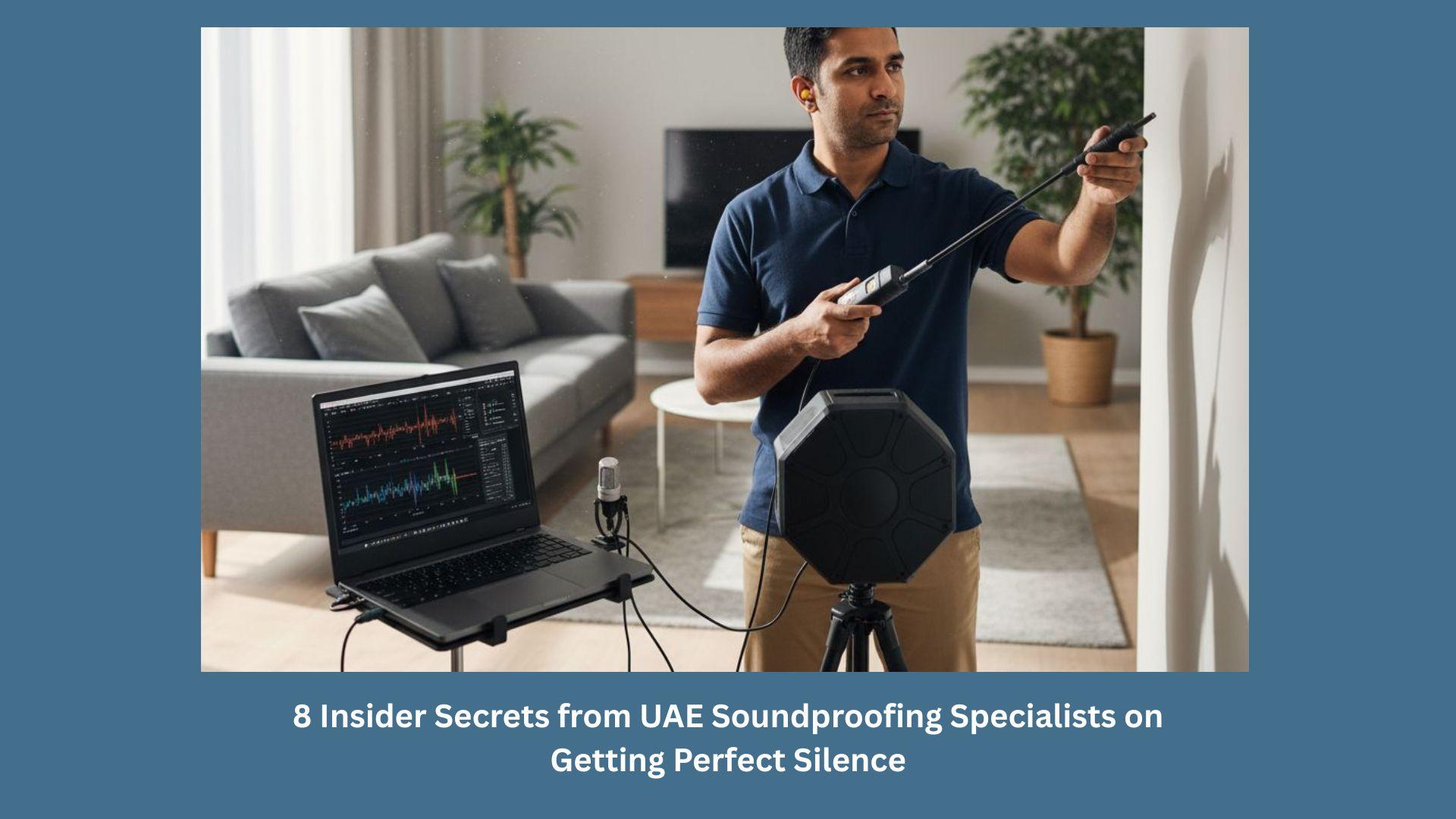Ever tried to relax at home but couldn’t escape the sound of a neighbor’s footsteps, a TV two walls away, or traffic that somehow feels like it’s in your living room? In a fast-growing city like Dubai or Abu Dhabi, peace and quiet are luxuries — but not impossible ones. If you’ve ever wondered how the pros make a home feel like a private cocoon, you’ll want to hear what the top soundproofing companies in UAE actually do differently.
Below are eight secrets they swear by — shared in plain language, so you can understand what really matters before you start investing in silence.
1. Silence Starts with Understanding the Enemy
Most homeowners think soundproofing means “just add thicker walls.” Not quite. Professionals start by listening — literally — to the problem. There are two main types of noise:
-
Airborne noise, like voices, TV, or music.
-
Impact noise, like footsteps, furniture movement, or door slams.
The fix for one doesn’t always fix the other. A soundproof consultant uses specialized meters to pinpoint where sound travels — it might sneak through ventilation gaps, electrical sockets, or even floor joints. Here’s the thing: without that diagnosis, you risk paying for the wrong solution.
2. It’s Not About Stopping Sound — It’s About Containing Vibration
Sound is vibration, and materials react to it differently. Dense materials like concrete block some noise, but flexible materials absorb vibration better. That’s why the best soundproofing specialists don’t rely on a single product. They layer — mixing mass (like drywall) with absorption (like acoustic foam or fiberglass) and isolation (like resilient channels).
Think of it like building a sandwich for silence: one layer stops sound, the next softens it, and another prevents it from traveling further.
3. Gaps Are the Hidden Culprit
You can install premium acoustic panels, but if there’s a 2-mm gap under your door, noise will find its way through. Even a small air leak can reduce sound insulation by up to 50%. Pros spend extra time sealing these “leak points.”
That means using acoustic sealant around outlets, rubber door sweeps, and window gaskets that create airtight seals. Believe it or not, one of the cheapest upgrades you can make is a high-quality door seal kit — and it can cut hallway noise dramatically.
4. Windows: The Weakest Link
Glass is elegant, but acoustically, it’s a traitor. Single-pane windows do almost nothing to stop sound. The specialists’ secret? Double- or triple-glazed acoustic glass — with gaps filled by inert gas like argon.
In UAE homes, where external noise often comes from traffic or construction, upgrading windows is one of the most effective (and instant) transformations. If you rent and can’t replace windows, secondary glazing — a removable inner glass layer — offers surprising results.
5. Acoustic Panels Aren’t Just for Studios
Many homeowners associate acoustic panels with recording studios, but designers now integrate them beautifully into modern interiors. You’ll see decorative wall panels, fabric-wrapped ceiling clouds, or wood-slatted designs that double as art pieces.
The real magic lies in placement. Pros know where reflections bounce off surfaces and install panels in those zones to absorb the echo. Done right, it doesn’t just silence — it warms the sound of your space, making conversations softer and rooms cozier.
6. Floors Matter More Than You Think
If you live in an apartment, impact noise — footsteps, dropped items, moving furniture — is probably your biggest headache. One secret trick from specialists is to “float” the floor.
They install an underlayment — usually rubber or cork — that sits between the subfloor and your surface flooring (like tiles or laminate). This isolates vibrations so they don’t transfer through the structure.
For villas, rugs with sound-absorbing pads can make a surprising difference, especially in high-ceiling spaces where sound tends to bounce.
7. Treat Ceilings as the Final Frontier
Most homeowners forget the ceiling, but in many UAE apartments, it’s the gateway to noise from upstairs neighbors. Professionals often create a suspended ceiling — a second layer with acoustic insulation between it and the original slab.
That air gap and insulation combo traps impact and airborne sound. It’s a bit of an investment, but if you’ve ever lost sleep to heavy footsteps, it’s life-changing.
8. True Silence Comes from Layered Strategy
Here’s the insider truth: no single product or material “soundproofs” a home. The secret is in the system — how materials, design, and installation all work together.
Professionals treat walls, ceilings, floors, and even fixtures as one integrated sound barrier. When done correctly, you won’t just block sound — you’ll create a calmer energy in your home. People often say it feels like the air itself becomes softer.
Why Proper Soundproofing Is Worth It
Beyond the obvious peace of mind, there are other benefits:
-
Better focus: Great for home offices or study areas.
-
Improved sleep quality: Especially in noisy urban areas.
-
Energy efficiency: Acoustic materials often insulate against heat, too.
-
Higher property value: Sound-treated homes are seen as premium.
If you’ve ever hesitated because soundproofing seems like a luxury, remember — silence isn’t just about quiet. It’s about mental clarity, privacy, and comfort.
A Look at How UAE Specialists Differ
Many soundproofing companies in UAE operate under strict acoustic standards — especially for residential towers and mixed-use developments. They use lab-tested materials that meet international benchmarks, ensuring long-term performance in hot climates.
Another local advantage: UAE specialists understand the quirks of construction here — hollow-core doors, thin partitions, and wide glass fronts — and they customize solutions accordingly. That regional expertise often makes the difference between a “decent” result and real peace.
FAQs
1. Can I soundproof just one room instead of the whole home?
Absolutely. Many homeowners start with bedrooms or home offices. Professionals can tailor partial solutions that minimize cost while still offering meaningful noise reduction.
2. Will soundproofing make my room completely silent?
No space can be 100% silent, but well-executed soundproofing can reduce noise by 70–90%. What you’ll notice is the quality of sound — quieter, softer, and less intrusive.
3. How long does a soundproofing project take?
Depending on room size and complexity, most residential projects take 3–7 days. Window or door upgrades are even faster.
4. Are soundproof materials safe for indoor use?
Yes, reputable companies use non-toxic, fire-rated materials designed for residential environments.
5. Can renters use temporary soundproofing solutions?
Yes — removable acoustic panels, draft seals, and thick curtains can make a noticeable improvement without any permanent alteration.
Conclusion
Getting perfect silence isn’t about luck or luckier neighbors. It’s about strategy, precision, and the right professionals who understand how sound behaves. If you’re serious about creating a calm, private space, working with expert soundproofing companies in UAE ensures every detail — from door seals to ceiling gaps — is handled with care.
Because when the world outside keeps getting louder, real luxury isn’t another gadget or décor upgrade. It’s peace — the kind that lets you hear your own thoughts again.



